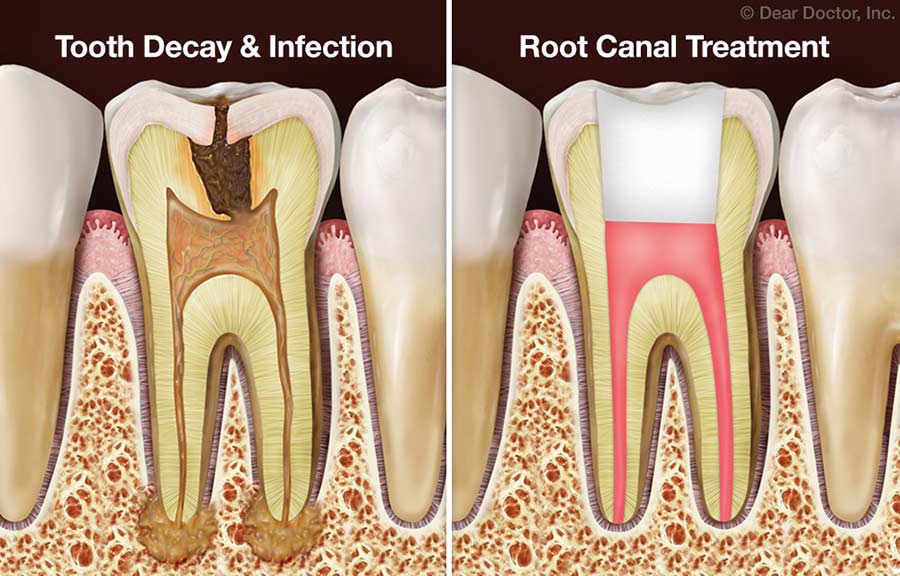ROOT CANAL THERAPY / ENDODONTICS IN CELINA/PROSPER/ GUNTER, TX FOR TOOTHACHE AND TOOTH REPAIR
Saving / Restoring Teeth to Function and Stopping Pain

Meet Your Doctor
Wen a Tooth Cracks or Has Deep Decay to the Nerve, Open Late Dentistry and Orthodontics Aims to Keep Root Canal Therapy as Efficient and Affordable as Possible, and Stop Toothaches From Causing Patients Pain that Keeps Them Up at Night and Missing Time From Their Work and Family Life
"With the Latest Advances in Technology, Root Canal Therapy can be more predictable than ever and help to save important teeth that help patients chew and smile with confidence." - Dr. Rouse
Why Would I Need Root Canal Therapy?

The 4 Main Reasons you might need Root Canal Therapy Are:
If You Answer “YES!” to Any of the Following You May Need a Dental Bridge:
1. Fractured Tooth - If your tooth causes pain when you put a load on your tooth, such as eating, your tooth may have an internal crack/fracture
2. Cavity - If your tooth has a cavity that extends into the nerve of the tooth, Root Canal Therapy can help alleviate the
pain
3. Irreversible Pulpitis - Inflammation of the pulp of your tooth causing lightening-type pain, and keeps you up at night, can be caused by irritating your dental nerve to the extent that it can not be reversed (Also Known As
Irreversible Pulpitis)
4. Infection - If your tooth is diagnosed with an infection the end of the natural root on a dental x-ray, but enough tooth above the your gum line is present to restore with a Dental Crown, a Dental Implant with Extraction may be avoided, saving time and money
Am I a Candidate for Root Canal Therapy?
If you answer "YES" to any of the following questions, you might be a candidate for Root Canal Therapy:
1. Is your tooth throbbing at night?
2. Do you have pain when you eat on a particular tooth that feels like a crack is running to the nerve of the tooth?
3. Does your tooth experience hot or cold sensitivity that lingers for minutes or hours?
Why Choose Open late Dentistry and Orthodontics for Treating Your Toothache?
A Great ATMOSPHERE
Our hospitality will put as big of a smile on your face as your finished Dental Bridge!
From the moment you start the process, a friendly face will always be there to answer your questions about treatment and guide you through the process of transforming your smile.
PRECISE Results
We work with our Dental Lab using our 3D Scanner In-House to take your bite into consideration when considering where your teeth will end up, avoid remakes of your future bridge.
Dr. Rouse and the Open Late Dentistry Team take a limited 3D X-Ray on the tooth receiving Root Canal Therapy to devise a custom treatment plan to save the tooth, stop the decay and infection from spreading further, and predictably get patients out of pain.
We Save You MONEY!
By being in network with many Dental PPO plans and having an In-House Membership Plan with multiple financing options, we make it easy to say yes to getting the smile you’ve always dreamed about.
Financing Options
We are a family dentist located in Celina, Texas (TX), serving patients of all ages from Prosper, Gunter, Aubrey, Frisco, Anna, and the surrounding areas.
Conveniently Located in Celina, TX, and LOVE Our Community!
Big-City TECHNOLOGY in Your Back Yard
We use 3D Technology to find every nerve in every root of your tooth. This saves you time in the chair and assurance that you will be out of pain when you leave.
We are a family dentist located in Celina, Texas (TX), serving patients of all ages from Prosper, Gunter, Aubrey, Frisco, Anna, and the surrounding areas.
TOUR OUR OFFICE!
See Our OVER 300+ Google Reviews with 5 STAR RATINGS
Don't just take our word for it. When it comes to who you trust your dental care with, see what our Celina-area residents are saying about the Open Late Dentistry and Orthodontics Team
DR. ROUSE PLANS EVERY CASE BEFORE IT STARTS
Dr. Rouse virtually plans your dental implant surgery while you are sipping your morning coffee. This makes the day of surgery a smooth transition.
Root Canal Therapy F.A.Q.s
Are Root Canals Painful?
For some reason, root canals received an unearned, unfair reputation for causing pain. In fact, most patients discover that the discomfort is similar to a routine cavity filling. Endodontists are experts at relieving pain. In fact, once the recovery process is complete, most patients return to a life without the pain that led them to receive a root canal in the first place. Patients usually start to experience relief from the tenderness in 24 to 48 hours after a root canal.

Can Dental Procedures Cause Canker Sores?
If you visited a dentist recently and a canker sore, or a smallish open sore, appears on your gums, you are not alone.
These sores are a common condition that many people experience after a dental visit and usually disappear in 7-10 days.
During your dentist visit, your gums were rubbed and irritated, this may be the cause. We work to make sure your visits are stress-free as possible.
But, because these sores are not entirely understood medically, or why they appear, becoming familiar with some simple treatments available may be helpful. To speed up healing and numb the irritation of those annoying (and possibly painful) sores, here are some options.
A homemade solution of half water, half hydrogen peroxide as an oral rinse (and spit!) can be very soothing.
Also, by applying Vitamin E oil to the sore, many people found relief and quicker healing times.
A variety of over-the-counter pain relievers are also available.
These products may alleviate some of your discomfort from a canker sore.
However you choose to treat canker sores, remember a few things:
As much as 25% of the population experience canker sores.
The slight trauma to your gums after a dentist office visit may trigger them.
They are not contagious. The true cause of canker sores is unknown.
Most canker sores heal within 7-10 days.

How Long Does It Take To Feel Normal After A Root Canal?
After a root canal, most patients feel mild discomfort or tenderness while healing. Taking an anti-inflammatory pain reliever like ibuprofen usually helps. Sometimes a patient also needs a crown or other form of restoration. If that applies, the healing process will be complete after treatment is complete.

Does Endodontic (Root Canal) Treatment leave me with a dead tooth?
Root canal treatment removes nerve tissue, and blood vessels and capillaries from your tooth. Sometimes this tissue is living but in many cases (such as an infected tooth or dental abscess) these tissues are dead or necrotic already. While a root-canal-treated tooth is technically dead or non-vital, you can still perceive chewing pressure with your tooth. This is because there are millions of tiny nerve fibers in the Periodontal Ligament that wraps around the outside surface of your tooth roots.

Can any tooth be treated with a Root Canal?
Interestingly, the answer is no. In some cases, a painful or infected tooth requiring treatment my have a calcified pulp or nerve. This occurs when the soft tissue in the root canals becomes hardened over time. In these cases, it may not be possible to complete the necessary treatment and, instead, tooth extraction will be the only option. Occasionally, your Dentist will refer you to a Endodontist for a 2nd opinion. This will enable them to give you information on the likelihood of successful endodontic treatment.





















Facebook
Instagram
X
Youtube